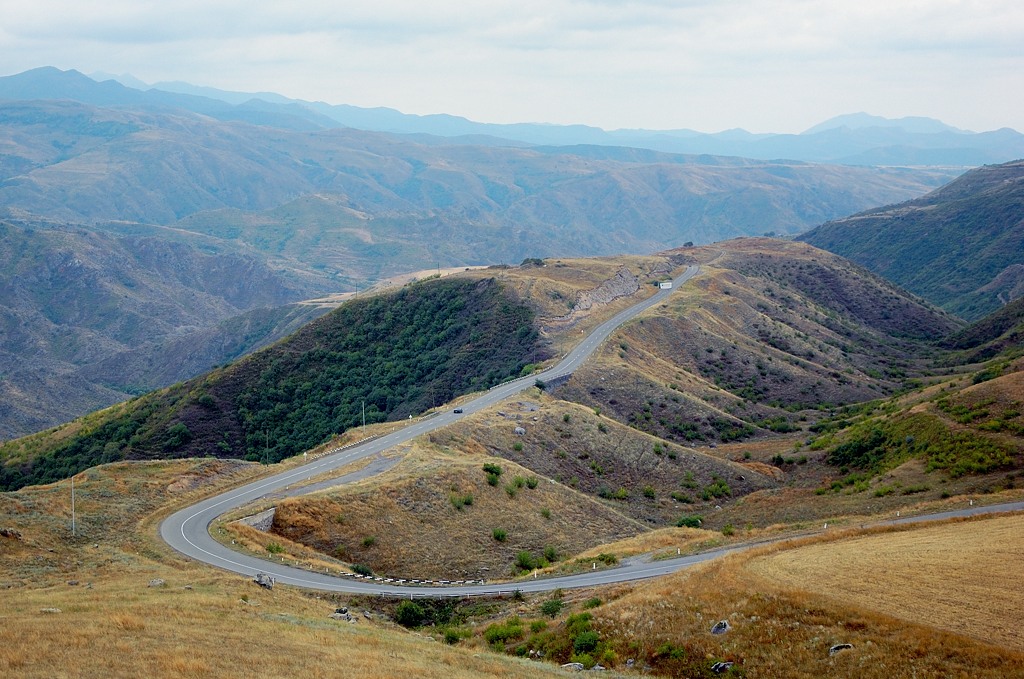The European Parliament (EP) urged Yerevan on Wednesday to reconsider its decision to construct a highway connecting Armenia and the Nagorno-Karabakh region of Azerbaijan that has been under the occupation of Armenia's forces since the 1990s.
‘‘The decision to build this highway has been taken without the consent of the competent authorities of Azerbaijan – in violation of international law,’’ reads a joint statement issued by Marina Kaljurand, Traian Băsescu, and Željana Zovko, members of the European Parliament, which serves as the legislative branch of the European Union (EU).
Marina Kaljurand chairs the delegation to the EU-Armenia, the EU-Azerbaijan and the EU-Georgia Parliamentary Committees, while Traian Băsescu and Željana Zovko are the European Parliament’s standing rapporteurs on Armenia and Azerbaijan, respectively.
At the same time, European Parliament officials recognized in their statement the occupation of Azerbaijan's Nagorno-Karabakh region and adjacent districts of Qubadli and Jabrayil through which the new highway is expected to pass.
‘‘In addition, it could symbolically entrench the illegal occupation of Nagorno-Karabakh and of its surrounding districts. Therefore, we very much deplore this initiative as it does not help to create conditions conducive to trust, peace and reconciliation," the statement adds.
‘‘This new road infrastructure will connect Kapan, in Armenia, with Hadrut, in Nagorno-Karabakh, passing through the districts of Qubadli and Jabrayil, which are also occupied,’’ it stated.
Last year, Armenia’s government announced it would begin construction of the 150-kilometer long highway connecting the city of Kapan in Armenia and Hadrut settlement of Khojavand district in the occupied Azerbaijani territories. Earlier this month, Arayik Harutyunyan, the so-called "president" of the illegal regime in the occupied Nagorno-Karabakh region reaffirmed in a Facebook post Armenia’s intention to move ahead with the construction project.
If built, the road will be the second of its kind along with the 300-kilometers long highway launched in 2017, connecting occupied Azerbaijani towns of Aghdara and Kalbajar with Armenia’s Vardenis town. The Lachin corridor — a mountain pass and the shortest route between Armenia and Azerbaijan's Nagorno-Karabakh region — has been under the occupation of Armenia's forces since 1992 and used to be the only route connecting Armenia and the occupied Azerbaijani territories.
Tensions between Armenia and Azerbaijan have high over the last three decades following a four-year full-scale war in the early 1990s. Armenia launched an all-out military campaign to occupy the region, where partial ethnic Armenian population lived side by side indigenous Azerbaijanis.
A full-scale war lasted until the ceasefire in 1994 and resulted in Armenia occupying all of the Nagorno-Karabakh region and seven surrounding districts — all comprising approximately 20 percent of Azerbaijan’s internationally recognized territory. The death toll for Azerbaijan stood at 30,000, while another one million were forcibly expelled from their homes and were resettled in towns across the country.
Armenia has been keeping historically and internationally recognized Azerbaijani lands under its occupation despite four UN resolutions demanding withdrawal of Armenian forces from occupied Azerbaijani territories, and international mediation by the US, France, and Russia within the OSCE Minsk Group.
In the recent statement, European parliamentarians reiterated their ‘‘unwavering support’’ to the efforts of the Minsk Group and the 2009 Basic Principles designed for a peaceful settlement of the Nagorno-Karabakh conflict.
‘‘For this mediation to have a chance of success, we call on the authorities of Armenia and Azerbaijan to step up their commitment, in good faith, to the negotiation on the peaceful resolution of the conflict within the internationally recognized borders of Azerbaijan,” reads the document issued on June 10.
Meanwhile, Azerbaijan’s Foreign Ministry has responded to the highway project and joint statement by the members of the European Parliament.
On June 11, the ministry’s press service issued a statement which reads that the main reason for the construction of the road infrastructure in the Nagorno-Karabakh region is to consolidate the occupation of the Azerbaijani territories.
‘‘The recent joint statement by the members of the European Parliament with regard to the illegal activity of Armenia should be considered as concrete appeal addressed to the occupying country,’’ the document reads.
According to the Azerbaijani government data, Armenia has been engaged in illegal activities within the occupied territories of Azerbaijan, including illegal mining of natural resources and production of goods, and plays the role of a transshipment point for transporting these natural resources and products to foreign markets.
"The illegal activities of Armenia contradict its own international obligations, and are also a gross violation of the norms and principles of international law, as well as the Geneva Conventions of 1949 and their Additional Protocols," the statement reads.







 Iran's senior military leaders described the drone and missile attack on Israel on April 14 night as “successful".
Iran's senior military leaders described the drone and missile attack on Israel on April 14 night as “successful".
 The number of evacuees from flooded areas in Kazakhstan has reached 97,852 people, including about 32,856 children since March 27.
The number of evacuees from flooded areas in Kazakhstan has reached 97,852 people, including about 32,856 children since March 27.
 Iranian President Ebrahim Raisi warned Israel that it would face a "real and extensive" response if it makes any "mistake" following Tehran’s missi...
Iranian President Ebrahim Raisi warned Israel that it would face a "real and extensive" response if it makes any "mistake" following Tehran’s missi...



